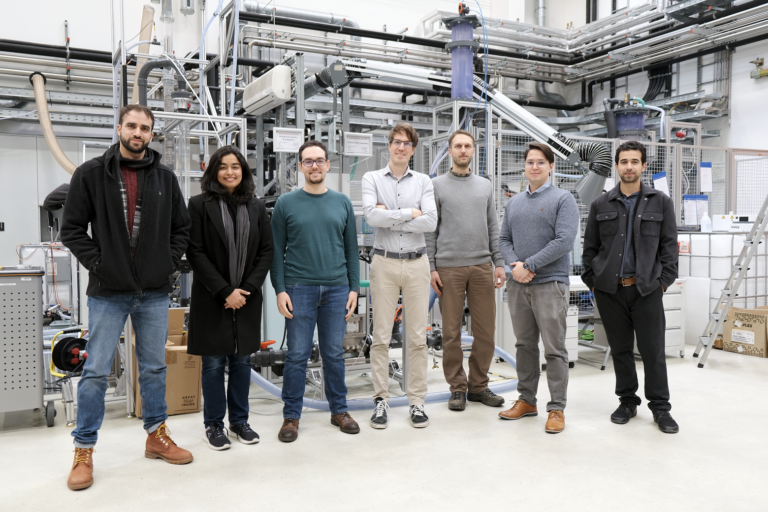Dr. Gregory Lecrivain is head of the DRESDEN-concept Research Group PRONTO
Born in France, Dr. Gregory Lecrivain gained his doctorate in the UK, carried out research in Japan on a Marie Curie Fellowship, and now heads the Particle Resuspension in Environmental Flows (PRONTO) research group in Dresden. PRONTO is a DRESDEN-concept research group that sees the TUD’s Chair of Transport Processes in Hydrosystems and the Helmholtz-Zentrum Dresden-Rossendorf (HZDR) working in close partnership. For their research, the group can draw upon the excellent infrastructures offered by the HZDR and TUD.
We asked him three questions on his career to find out what makes his research group so special.
You grew up in France and obtained your PhD in the UK. What prompted you to come to Dresden as a postdoc in 2009 and why do you still live and work here today?
I was born in France and did my doctorate in Manchester. After my PhD, I wanted to continue my research in Europe. Dresden has always been an attractive scientific location for me, so I ended up coming to TUD as a postdoc and I initially planned to stay for two years. At that time, I worked on an industrial project in the field of fluid mechanics. I then moved to the HZDR, where I continued my work at the Institute of Fluid Dynamics. Since then, I’ve got a family here, hobbies and I enjoy volunteering. Dresden has become my new home. And I’m really happy here. I also enjoy my work a lot. The Helmholtz Association is particularly important in making decisive contributions to solving various challenges of our time. For example, my group is currently working on a global challenge, namely the release of microplastics into flowing waters.
As a Marie Curie Fellow, you spent two years at Kyoto University, Japan. What did you take away from your time there that still shapes your work in Dresden today?
I was a researcher at Kyoto University for two years, which was enriching for me in many ways, both personally and professionally. The working group in Japan was relatively small, with only two PhD students and three postdocs, but the quality and originality of the work was excellent. Due to the size of the group, we had very few organizational tasks to deal with and were able to concentrate on exchanging ideas and developing new ones on a daily basis. I liked that a lot. I still enjoy working in the lab and writing scientific papers myself. Due to the language barrier, however, it wasn’t always easy for me to do everyday things. My Japanese colleagues always took the time to help me out. That also stayed with me. And its one of the reasons that I am very happy to return the favor and support my international colleagues today. The International Offices of the HZDR and TU Dresden as well as the DRESDEN-concept Welcome Center at TU Dresden also provide great support. However, it was difficult to find the right work-life balance in Japan. The approach to work there is really quite different. Dresden offers a higher quality of life.
Your research group is supported by both the HZDR and TU Dresden. What does this entail for your group and your research work?
I can summarize it in one word: Excellence! The DDc group effectively combines the excellent infrastructures of both the HZDR and TU Dresden. At HZDR, we have access to the ultrafast electron beam X-ray computer tomography system, a globally unique imaging technique with enormous potential for the investigation of microplastic transport. TUD has high-performance computers and computer models for the realistic simulation of particle-laden water flows. The close cooperation with TUD opens up a new and exciting field of research for my group. The measurement technology developed in my department is primarily used for matters relating to energy and process engineering. For the first time with this project, we are applying this technology to an environmental research topic that affects us all, namely the spread of microplastics. My group benefits greatly from the collaboration with Professor Bernhard Vowinckel from the Faculty of Environmental Sciences, who is working on the particulate distribution and dispersion of various pollutants that occur both in aquatic ecosystems and in anthropogenic settlement areas. Ronaldo, the new postdoc in the group, is already fully committed and spends three days a week at the HZDR and two days at TUD.
 © HZDR/Till Bayer
© HZDR/Till Bayer
About DRESDEN-concept Research Groups:
DRESDEN-concept offers outstanding early-career researchers an optimal environment for establishing their own independent research group and provides them with appealing career opportunities. These groups address innovative research topics and can draw on the expertise of two DRESDEN-concept partner institutions, which jointly host the DRESDEN-concept Research Group.
 © HZDR/Till Bayer
© HZDR/Till Bayer